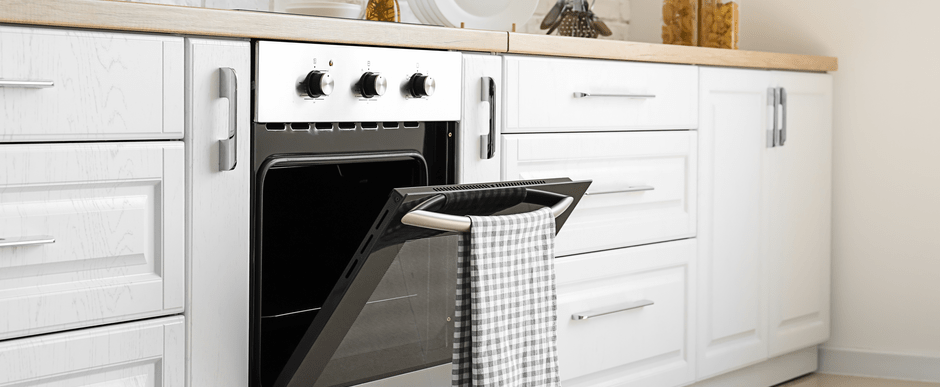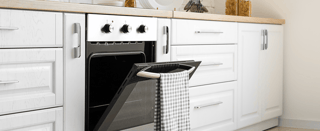How long do ovens last?
The lifetime of an oven depends on many factors. We’ll discuss them here.

Key tips to remember
- Read our appliance maintenance guide to help get into the maintenance mindset
- Get into the habit of cleaning your oven regularly and keeping it that way
- 20 years of service from a well-maintained, high-quality oven is possible
- Don’t rely on the self-cleaning function alone because it can speed up wear and tear
- Don’t spend more than half of what you’d spend on a new oven to fix the old one
How long should an oven last? With fewer moving parts than other major appliances, most ovens are built to last. However, answering the longevity question isn’t easy because there are so many variables impacting the lifespan of your oven. The short answer is 15 to 20 years for stand-alone gas ranges, often the longest-lasting appliance in the home. Wall ovens, however, can take a lot more money and effort to replace, so they’re worth taking care of, as you would any major appliance investment.
How long do electric ovens last, and how long do built-in ovens last? The truth is they’re very close in life expectancy, with electric ovens coming in just a little short at 13 years versus 15 years for gas ovens, but these are only estimates. Built-in ovens are often more expensive because they require construction and insulation and must fit perfectly into walls and around obstructions. Double-oven life expectancy is about the same as any other oven. Mostly, oven longevity hinges on the user’s interest in making their oven last, so get used to keeping your eye on yours. If it starts acting funny or working unreliably, don’t just adapt and move on. This could be a sign of bigger problems ahead. Like any expensive equipment or appliances in and around your home, if you take better care of them, they last longer.
Life expectancy factors
- Initial quality: Going with a well-established brand name upfront can factor into your oven’s build and whether it’s composed of quality OEM parts that will last. Good parts can impact your oven’s lifespan and could add a decade of service.
- Usage frequency: It’s not uncommon for people to use an oven daily, even multiple times daily at that. Being a heavily used appliance, most ovens are built to last accordingly. But the more you use it, the more quickly it will experience wear and tear.
- Level of care: Your level of care is determined by keeping your oven clean and running well with regular maintenance. Neglected, dirty ovens are much more likely to underperform and malfunction over time.
Manual cleaning habits
Speaking of cleaning, it’s a great idea to get into the habit of cleaning your oven regularly every three months or so by hand, as well as anytime there’s a spill or baked-on problem that begs your attention. Get used to wiping down the interior, exterior and door gaskets. You can even run your racks through the dishwasher periodically. If you leave spills for long enough, they can leave unsightly blemishes and lead to a decline in reliability. Consult your oven’s owner’s manual (online if you don’t have a hard copy) for the best recommended approaches to cleaning and related products and techniques. Make sure to ventilate the home before using any chemical cleaners, and always use gloves and eye protection. After cleaning, rinse the oven completely before use.
Self-cleaning considerations
In addition to manual cleaning techniques, there is often another option that many ovens possess for serious deep cleaning: the self-cleaning feature. However, if your goal is to have your oven last as long as possible, it’s not recommended that you rely on the self-cleaning feature regularly. It uses extremely high temperatures and is often thought to shorten oven lifespans as a result of the wear and tear on oven components impacted by this high-temperature treatment. Still, using the self-cleaning feature once in a while can be an effective way to banish buildup and make a fresh start for your regular rounds of manual cleaning. Just make sure to always ventilate your living space, be ready for smoke, evacuate pets and remove the racks. Afterward, clean out all the resulting ashes.
Maintenance mindset
In addition to regular cleaning, there are other factors that contribute to the wide range of answers to the “how long do ovens last” question, like regular annual maintenance. If you’re determined to take care of your oven, it only makes sense to have a professional inspect it annually, just as you would any other major appliance, like your HVAC unit or dishwasher. Even if you’re a careful and conscientious appliance owner, a pro can spot things that you might miss and help you save money on big repairs with preventive fixes that can help your oven perform like new for longer. A profressional inspects everything from hinges and gaskets to wiring, switches and programming during a maintenance check, and can also help recalibrate your oven to make sure it’s reaching the temperatures it registers on the screen. If your oven malfunctions, don’t wait for your annual visit to request a service call.
Signs you might have a problem
Part of taking good care of your oven means keeping an eye on the details, in terms of not only cleanliness and regular maintenance, but also functionality and performance. An oven that isn’t working as it should will send signals. If you’re tuned into these frequencies and pick up on them, you’ll be ready to act at the first sign of a problem. These signals can include everything from a failure to reach and sustain the temperature indicated by the unit’s readout to a sudden increase in your utility bill or a buildup of food residue (or even rust). They might include weird noises or misaligned components or doors. They could even be as simple as a burner that fails to light, a timer that no longer functions, or a complete breakdown of the digital interface — if your oven has one — leaving you with no way to tell what’s happening. Sometimes the most obvious sign is smoke, so here are our suggestions for troubleshooting a smoking oven. The bottom line is that watching for signs of problems helps to get you into the mindset of paying closer attention to your oven so you can catch fixable problems before they snowball into replacement-level events (and expenses).
Avoid these mistakes
Failing to clean up a spill in the oven can lead to problems later because residue can become burned permanently into the finish, create unwanted smells and even produce smoke. It’s always best to clean up a spill as soon as it’s cool enough to do so safely. One way to avoid spills in the first place is to take extra care to ensure that the pots and dishes you bake with are large enough to contain whatever is cooking so that sauces or other ingredients are less likely to bubble over the sides. If you find yourself in a situation where you suspect your dishes might overflow while baking, go ahead and place a baking sheet underneath them to catch any spills. Avoid the temptation to line the bottom of your oven with aluminum foil because it can become a fire hazard and even melt and damage the oven as a result.
Repair versus replace
The lifetime of an oven varies depending on what you put into it. Deciding whether to repair or replace a malfunctioning oven can be tricky. Before deciding, you may want to read our guide to common oven repairs. One good rule of thumb is to consider what you’d be willing to spend on a replacement if you had to buy a new oven. Then factor in the cost estimates you’ve received (ideally from at least three service vendors). If the average cost of your three repair estimates adds up to half or more of what you’d spend on the new unit, you may have all the information you need to go ahead and make the jump to a new oven. Then again, if you have an older unit that only needs minor repairs, a simple fix could result in many more years of service. This is particularly common for high-end brands that tend to last longer.
At this point, you might be wondering whether a home warranty covers appliances. A little additional reading of our wide selection of helpful home improvement and maintenance posts could be useful. Thanks for stopping by!
The information in this article is intended to provide guidance on the proper maintenance and care of systems and appliances in the home. Not all of the topics mentioned are covered by our home warranty or maintenance plans. Please review your home warranty contract carefully to understand your coverage.



